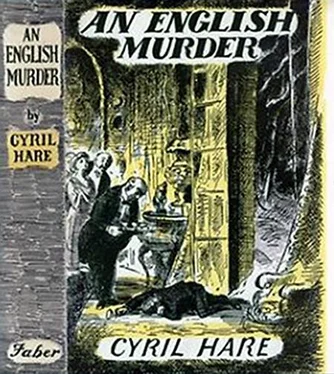"As you please, Sergeant. I repeat, it does not concern me. But this time I shall save myself embarrassment by remaining outside."
Sergeant Rogers walked woodenly down the corridor to the door of Mrs. Carstairs' room. As Dr. Bottwink had done, he listened for any sounds within. Like Dr. Bottwink, he knocked, but twice, and even more loudly. Then he flung open the door.
Mrs. Carstairs was not in bed. She was sitting in a chair, staring straight at the door with wide-open eyes. She was quite dead.
"But no!" said Dr. Bottwink wearily. "It is impossible! By all the rules of logic and reason, it is impossible!"
"But it has happened, Dr. Bottwink," said Rogers.
The four men were huddled about the library fire. Under the impact of disaster, precedence was forgotten, and Briggs, uninvited, had sat down with the rest. He was ashen pale and his hands were shaking uncontrollably. Of the others, Julius seemed stupefied, his eyes glazed, his movements slow and halting. Bottwink had collapsed like a balloon suddenly deflated. Even his round, full cheeks sagged, and there was a yellowish tinge to them that had not been there before. As to Rogers, his face bore no expression except an immense fatigue. He rolled a cigarette, his fingers going about their task automatically, but when it was completed he made no attempt to light it. Instead, he remained staring at the little paper cylinder in his hand, as though wondering how it got there.
"The thing is so absurd!" Dr. Bottwink protested almost querulously. "Mrs. Carstairs, of all people!"
"I don't understand you," said Julius heavily. "If there is a maniac in this house going about murdering people, is there any reason why Mrs. Carstairs should have been safer than anyone else?"
"If there is a maniac, then there is no reason for anything. That is logical. That I can comprehend. But I have seen no signs of mania here. On the contrary. I have assumed a murderer who is sane, and on that assumption there were just two people, two only, whose lives I was prepared to consider secure—Mrs. Carstairs and yourself, Sir Julius. But now——" He shrugged his shoulders and was silent.
"May I ask, sir, why you should choose to bring my name into the matter, on any assumption?" said Julius. "Are you implying——"
"This is getting us nowhere," Rogers interposed. "Let us stick to the facts. Mrs. Carstairs has died, apparently in exactly the same way that Mr. Robert Warbeck died—from cyanide poisoning."
"There is no question that it was cyanide," Dr. Bottwink murmured.
"An analysis will have to be made in due course," the detective went on, "but all the evidence points to her having taken the poison in her tea. We know that there is a bottle of this poison somewhere in the house, but although I have searched her room thoroughly I have been unable to find it there. We can assume, therefore, that it was not self-administered. In that case, the poison was in the tea before Mrs. Carstairs brought it into her room."
Rogers paused and cleared his throat. As he went on in his flat, tired voice, Briggs began to tremble violently.
"We know something of the history of that tea," he said. "It was made, not for Mrs. Carstairs, but for Lady Camilla Prendergast, and taken up to her room by the deceased. Apparently, it was only the chance that Lady Camilla was asleep that induced Mrs. Carstairs to drink it herself, instead."
"But why should she have done that?" Dr. Bottwink broke in. "Her own tea was waiting for her here. It seems to me most unnatural——"
"I am dealing simply with the facts," said Rogers coldly. "I have not yet seen Lady Camilla about this, but if she was in truth asleep when Mrs. Carstairs came to her room, as she certainly was when we came to it, the facts seem to be pretty clear. From this it follows that if the tea was deliberately poisoned, it was intended to kill not Mrs. Carstairs but Lady Camilla. Now the tea was freshly made in the kitchen——"
"I swear to God, sir, I never put anything in it!" cried Briggs.
"Made in the kitchen," Rogers repeated inexorably. "Brought in here by Briggs and handed to Mrs. Carstairs. So far as we know, it never left her hands until she died. Briggs," he turned abruptly to the white-faced butler, "you made the tea, did you not?"
"Yes, Mr. Rogers," said Briggs in a voice hardly above a whisper. "That is, I—yes, I made it."
"Was anybody else with you at the time? The cook, where was she?"
"She and the rest of the staff were taking their tea in the housekeeper's room. I—I was quite alone."
Rogers gave him a look of infinite weariness in which seemed to hide a touch of compassion.
"You had better tell the truth, you know," he said. "Who was with you in the kitchen?"
After a few seconds' silence that seemed to last a very long time, Briggs said in a strangled voice, "My daughter was with me for part of the time."
There was another silence, during which Rogers seemed to become aware once more of the cigarette in his hand. He smoothed out its crumpled exterior, put it in his mouth, lighted it and blew out a cloud of acrid smoke before asking, "What part did she take in the tea-making?"
The men circled round the fire had to strain their ears to catch the reply. Briggs's head was sunk on his chest and his voice hardly rose above a whisper, as the words came tumbling helter-skelter from his pale lips.
"I was cutting the bread and butter at the kitchen table," he said, "when my daughter came into the room. The kettle was on the range behind me and just coming to the boil. She asked me who the tea was for and I told her. I'd warmed the pot and put the tea in it all ready, out of the same caddy you had yours in here from. Then the kettle boiled and she asked me should she fill the pot. To save myself trouble, I told her, yes. I didn't so much as look round. She filled the pot and put it on the tray beside me and went out. That's all, gentlemen." He stopped abruptly and covered his face with his hands.
"But still I say it is impossible!" Dr. Bottwink exclaimed.
"Thank you, sir," Briggs murmured faintly. Then he rose stiffly to his feet.
"If you will excuse me," he said, "I will retire now. I have a good deal of work to do, and——"
"Just a moment, Briggs," said Rogers. "Before you go, there is another matter I want to ask you about. It was you who told us in the first place that Mrs. Carstairs had taken the tea intended for Lady Camilla to her own room. You had that information from your daughter?"
"Yes, Mr. Rogers. I reported it to you just as she told me."
"Your daughter seems to have been very much concerned in this affair."
"I—I can't believe that she had anything to do with it, Mr. Rogers."
"That is a matter she will have to explain to the proper authorities in due course. Where is she at this moment?"
"In her room, I believe. Do you wish to see her?"
The detective hesitated for a moment. "Yes," he said finally. "Ask her to come down here at once. And you are to tell her nothing of what has occurred, do you understand?"
"Very good, Mr. Rogers."
After Briggs had gone Rogers turned to Julius.
"As I told you this afternoon, Sir Julius," he said, "my business here is to protect you. I do not regard myself any longer as in charge of this case. It cannot be long now before the local police arrive, and it will be their business to carry out the investigations. But I think it my duty as a police officer to give them as full a report of the facts as I can. That is the only reason why I propose to interview this young woman. I take it you have no objection?"
"Take your own course," said Julius shortly.
"Would you mind very much," put in Dr. Bottwink, "if I were to be present when you see this young person? It would interest me greatly."
Читать дальше












